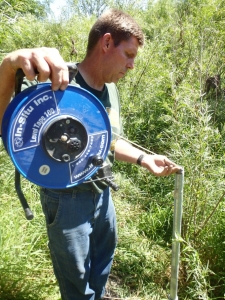Mike Gannon, IGS, Hydrogeologist

Iowa has been blessed with abundant water resources, which are necessary for cities, rural residents, industries and agriculture to grow and flourish. Iowa has been called “The land between two rivers”, with the Missouri River bordering the western edge and the Mississippi River the eastern boundary. Both surface water and groundwater have benefited Iowans and have made Iowa the breadbasket of the world, and provided an essentially ingredient for economic growth and jobs. The proper management of these resources will assure future residents the availability of an abundant and high quality water supply.
As a hydrogeologist with the Iowa Geological Survey (IGS) for 23 years, and as I approach retirement, I’ve had the privilege of working with Iowans to protect and manage Iowa’s water resources. As a fellow Iowan, I can attest to the State’s commitment to water quantity. Since 2008, the IGS has received approximately $500,000 per year from the Iowa Legislature to manage Iowa’s groundwater resources. During the past 14 years, all of Iowa’s regional bedrock aquifers, and numerous sand and gravel systems have been characterized, and three-dimensional groundwater flow models developed. These groundwater flow models have allowed the state to regulate, protect, and develop these water resources for both current and future generations of Iowans.
As we move into 2022 and beyond, future challenges and opportunities exist for Iowa’s groundwater resources and the IGS. From my perspective, I recommend the following actions to improve and expand the understanding and management of Iowa groundwater systems:
- A more extensive long-term groundwater level network is needed to properly manage Iowa’s local and regional aquifers.
- Hydrogeologic surfaces for each aquifer should to be updated and mapped in 3-dimensions and used to update the existing groundwater flow models.
- Drought monitoring strategies should be developed to more accurately characterize droughts and assist in drought prediction.
- Source water protection strategies are needed to reduce the impacts of nutrients on public wells and wellfields.
- Continue to work closely with the Iowa Department of Natural Resources to collect and evaluate data that can be used to help protect, regulate, and manage Iowa’s groundwater resources
Water is a critical for life and prosperity, and the investment in protecting and managing Iowa’s water resources is essential.